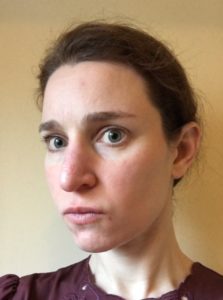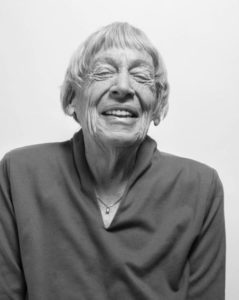By Jane Valentine
Jane E. Valentine, Ph.D., is an engineer and applied mathematician who is interested in the intersection of science, literature, and social issues. A native of Pittsburgh, she now resides in Champaign.
Ursula K. Le Guin, one of the most respected and decorated science fiction authors ever, died in January at the age of 88. While she is rightfully lauded for her outsized and transformative impact on science fiction and fantasy literature, those who view her as merely a genre author are missing out on a compelling body of work—novels, novellas, short stories, poems, essays, and speeches—that both subtly and deeply explores what it means to be human, as an individual and as part of a broader society.
Born Ursula Kroeber in Berkeley, California in 1929, Le Guin was the daughter of a writer and an anthropologist, and the influences of both disciplines are clearly evident in her writing, which delves deeply into alternative cultures, traditions, and ethnographic systems. Le Guin’s science fiction and fantasy worlds are not Western cultures with added technology or magic; they are fully conceived societies with their own histories, taboos, traditions, and cultural practices. In her 2014 acceptance speech at the National Book Awards (where she was awarded the Medal for Distinguished Contribution to American Letters), Le Guin celebrated visionary science fiction authors she called “the realists of a larger reality,” whose work, unfettered by the traditional conventions of the Western literary establishment, spoke to freedom, to humanitarianism, to hope. Le Guin herself was foremost among these realists, using invented worlds and cultures to write about what makes us human and how society shapes us. Her stories are anthropological and psychological explorations of the human condition and the intrinsic value of human life; of the damages of war, poverty, and oppression; and of reasons for optimism amidst fear and strife. Her work is deeply humanist, egalitarian, feminist, philosophical, and compassionate—and fundamentally hopeful.
A good example of the author’s talents is the first Le Guin story I ever read, “Buffalo Gals, Won’t You Come Out Tonight,” about a young girl who gets lost after an accident, falling into the fantastic world of the folktales of the American West, and living with the trickster character, Coyote. It is a deft and nuanced allegory about the impact of human civilization, especially in its industrial form, on wilderness and on individual humans. With quiet subtlety and surety, Le Guin turned the tale of a lost little girl into one about the losses we suffer when we turn our backs on nature, a characteristic achievement for the author.
Le Guin’s oeuvre is unusually broad-ranging, including children’s books; short, light fiction; epic novels; contemporary literary fiction; and quiet, thoughtful essays. The upshot is that there is a Le Guin book for everyone.
The Left Hand of Darkness explores an androgynous human society from the perspective of a gendered outsider; it won both the Hugo and Nebula Awards, the two biggest awards in science fiction. Her other novel to win both awards, The Dispossessed, which Le Guin described as an “anarchist utopian novel,” contrasts an anarcho-syndicalist society with authoritarian and capitalist ones. Both novels are part of the Hainish Cycle, a collection of tales set in human societies on mostly isolated planets, all of which have developed their own socio-political systems and cultures. The works of the Hainish Cycle all explore deep anthropological concepts via compelling stories about individuals.
For those looking for briefer and less involved anthropological explorations, Changing Planes is a collection of short stories and vignettes set in alternative societies (some human, some not), and includes fictional ethnographic studies along with more traditional narrative tales.
The Catwings books for young children (about a family of winged cats), the Annals of the Western Shore series for pre-teen and teenaged readers (three loosely linked novels about individuals with psychic gifts, living in a pre-industrial society), and the Earthsea series for young adults and adults (a high fantasy series comprising six linked novels and several short stories) provide young readers with ample beautiful prose and even more beautiful stories. Many of the ideas in these books are subtle and difficult, yet compelling, and challenge readers to think carefully about power, grief, love, loss, and choices.
Those who prefer their reading free of the devices of science fiction and fantasy may enjoy The Orsinian Tales, contemporary literary fiction set in a fictional country reminiscent of Soviet Europe; or Dancing at the Edge of the World, a collection of essays, reviews, and talks on four broad topics: feminism, social responsibility, literature, and travel. Missing from this collection is Le Guin’s excellent aforementioned acceptance speech, available online at https://www.npr.org/sections/thetwo-way/2014/11/20/365434149/book-news-ursula-k-le-guin-steals-the-show-at-the-national-book-awards.
Finally, I must recommend my first-ever Le Guin story, and my favorite still: “Buffalo Gals, Won’t you Come Out Tonight,” bundled with other nature stories and poems in Buffalo Gals and Other Animal Presences. Like the child protagonist who crosses over into the world of folklore, anyone who reads Le Guin is transported for a while from our world to one of the author’s imagination; one which, despite having been invented, is no less real or rich than our own.


